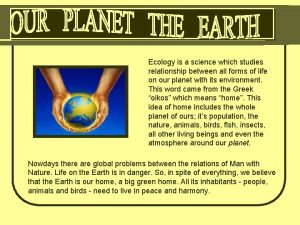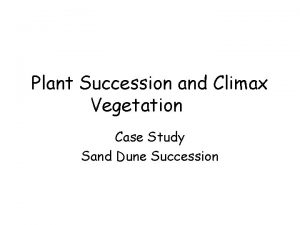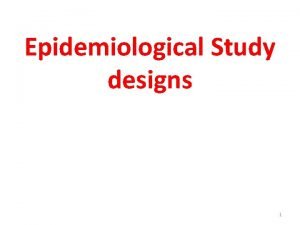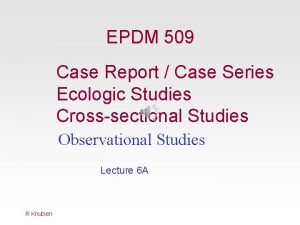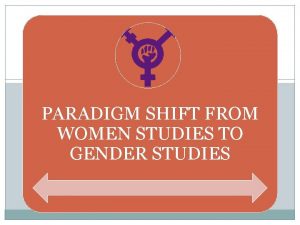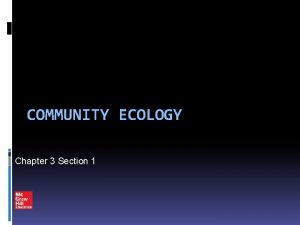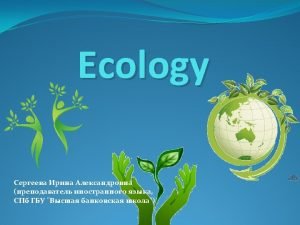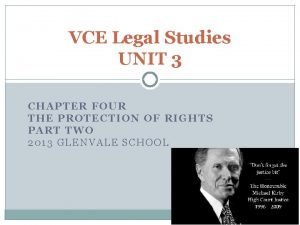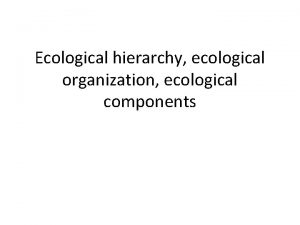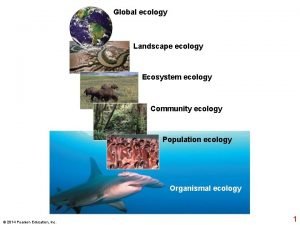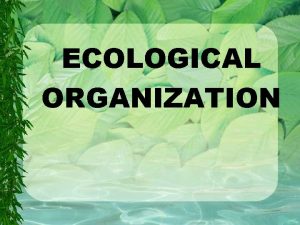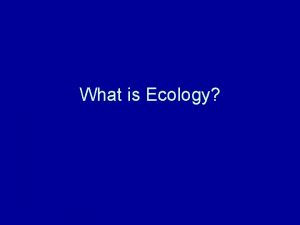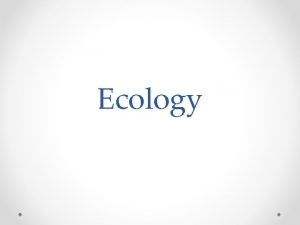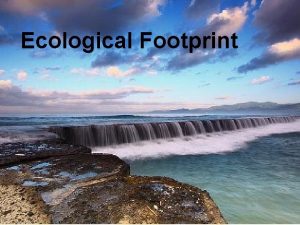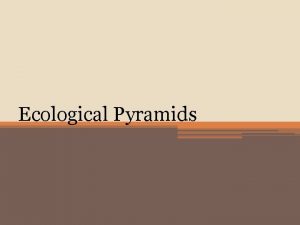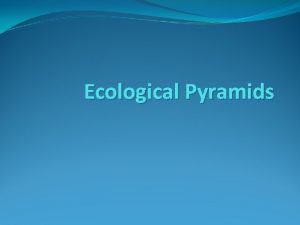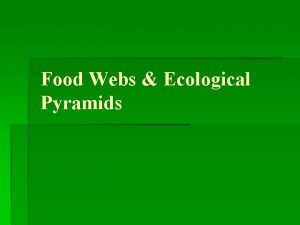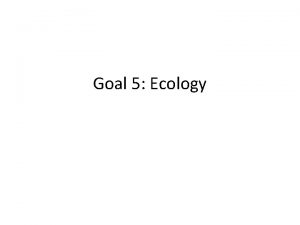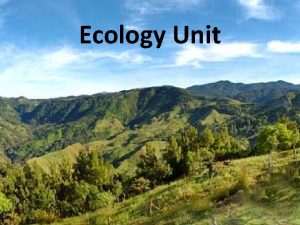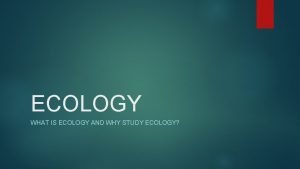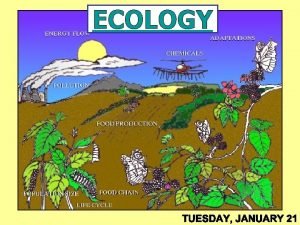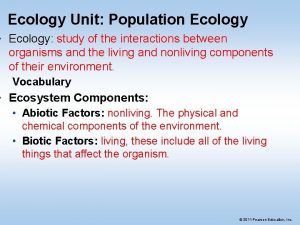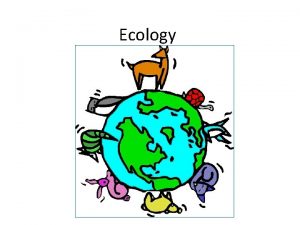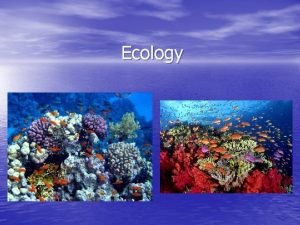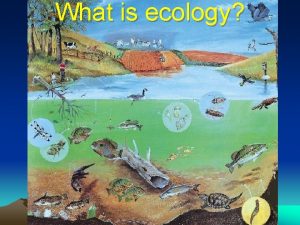ECOLOGICAL STUDIES Ecology is the study of how


































- Slides: 34

ECOLOGICAL STUDIES

• Ecology is the study of how living organisms relate with one another and their non-living surroundings. • Ecology is important in predicting, preventing and remedying environmental changes. • NB. Ecology is important in forestry, fishery and agricultural applications.


DEFINITIONS • • • • Habitat Herbivore Carnivore Producer Consumer Community Population Species Biosphere Atmosphere Lithosphere Hydrosphere Ecosphere • • • Predator Prey Decomposer/Sapprophyte Dentritivores Ecosystem Biome Ecological niche Potential/fundamental niche Realized niche


APPROACHES TO ECOLOGICAL STUDY

Habitat • Environs of a particular species , population or community; • Terrestrial or aquatic

Habitat

Ecosystem • All the biotic and abiotic in a vast designated area.

Ecosystem

Biome • A large, specific ecosystem, recognized by its characteristic climate, flora (plants) and fauna (animals). • Aquatic • Desert • Forest • Grasslands • Tundra

Biome

Species • A group of closely-related organisms capable of interbreeding to produce fertile offspring. • E. g. horse + horse = horse (fertile) • E. g. horse + donkey = mule (infertile) • E. g. monkey + gorilla = N/A

Population • Collection of individuals from same species inhabiting the same area.

Community • Collection of different populations inhabiting the same area.

Decomposer/ Sapprophytes • Bacteria and fungi that secrete substances onto dead organisms and waste in order to feed on them by absorption.

Decomposer/ Sapprophytes

Detritivores • Organisms (e. g. earthworms) that feed on small fragments of decomposing or dead materials (detritus).

Detritivores

Biosphere • The set of interactions between the atmosphere, the hydrosphere, the lithosphere and the ecosphere.

Atmosphere • A mixture of nitrogen (78%), oxygen (21%), and traces (remaining 1%) of carbon dioxide, argon, water vapor and other components. • Approximately 1, 100 km high.

Hydrosphere • The accumulation of water in all its states (solid, liquid and gas) and the elements dissolved it in (sodium, magnesium, calcium, chloride and sulphate). • 97% (oceans), 2% is ice (north and south poles) and 1% forms rivers, lakes, ground water and atmospheric vapor. • Covers around 71% of the earth's surface.

Lithosphere • The lithosphere is the thin crust between the mantle and the atmosphere. • Around 100 km thick.

Ecosphere • The set of all living organisms, including animals and vegetation.



Ecological Niche • Location and role or an organism in the ecosystem or community.

Ecological niche

Potential /Fundamental niche • Full range of biotic and abiotic conditions under which an organism can exist.

Potential /Fundamental niche

Realized niche • More restricted, narrower range of conditions for which an organism is best adapted.

Realized niche

Realized niche

• http: //apbiosemonefinalreview. pbworks. co m/w/page/11980952/Ecology%20(Ch%20 54 -56)
 Case series
Case series Ecology is a science which studies the relationship between
Ecology is a science which studies the relationship between Climax
Climax Classification of epidemiological studies
Classification of epidemiological studies Case series example
Case series example Paradigm shift from women studies to gender studies
Paradigm shift from women studies to gender studies Biology ecology study guide answer key
Biology ecology study guide answer key Chapter 3 section 1: community ecology answer key
Chapter 3 section 1: community ecology answer key Ecology is the study that helps to preserve
Ecology is the study that helps to preserve Outdoor education study design
Outdoor education study design Vce legal studies study design
Vce legal studies study design Vce theatre studies study design
Vce theatre studies study design Hình ảnh bộ gõ cơ thể búng tay
Hình ảnh bộ gõ cơ thể búng tay Lp html
Lp html Bổ thể
Bổ thể Tỉ lệ cơ thể trẻ em
Tỉ lệ cơ thể trẻ em Gấu đi như thế nào
Gấu đi như thế nào Chụp tư thế worms-breton
Chụp tư thế worms-breton Alleluia hat len nguoi oi
Alleluia hat len nguoi oi Môn thể thao bắt đầu bằng chữ đua
Môn thể thao bắt đầu bằng chữ đua Thế nào là hệ số cao nhất
Thế nào là hệ số cao nhất Các châu lục và đại dương trên thế giới
Các châu lục và đại dương trên thế giới Công thức tiính động năng
Công thức tiính động năng Trời xanh đây là của chúng ta thể thơ
Trời xanh đây là của chúng ta thể thơ Cách giải mật thư tọa độ
Cách giải mật thư tọa độ 101012 bằng
101012 bằng Phản ứng thế ankan
Phản ứng thế ankan Các châu lục và đại dương trên thế giới
Các châu lục và đại dương trên thế giới Thể thơ truyền thống
Thể thơ truyền thống Quá trình desamine hóa có thể tạo ra
Quá trình desamine hóa có thể tạo ra Một số thể thơ truyền thống
Một số thể thơ truyền thống Bàn tay mà dây bẩn
Bàn tay mà dây bẩn Vẽ hình chiếu vuông góc của vật thể sau
Vẽ hình chiếu vuông góc của vật thể sau Biện pháp chống mỏi cơ
Biện pháp chống mỏi cơ đặc điểm cơ thể của người tối cổ
đặc điểm cơ thể của người tối cổ

